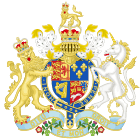Treason Act 1743 facts for kids
| Act of Parliament | |

|
|
| Long title | An Act to make it High Treason to hold correspondence with the Sons of the Pretender to His Majesty's Crown, and for attainting them of High Treason, in case they should land or attempt to land in Great Britain, or any of the Dominions thereunto belonging, and for suspending the operation and effect of a Clause in the Act of the seventh year of the late Queen Anne, for improving the Union of the two Kingdoms, relating to Forfeitures for High Treason until after the decease of the sons of the Pretender. |
|---|---|
| Citation | 17 Geo. 2. c. 39 |
Quick facts for kids Dates |
|
| Royal assent | 12 May 1744 |
| Other legislation | |
| Amends | Treason Act 1708 |
| Amended by |
|
| Repealed by | Statute Law Revision Act 1867 |
|
Status: Repealed
|
|
The Treason Act 1743 was an important law passed by the Parliament of Great Britain. It made it a very serious crime, called high treason, to communicate with the sons of James Francis Edward Stuart. He was known as "The Old Pretender" because he claimed to be the rightful king of Great Britain and Ireland.
His sons were Charles Edward Stuart, often called "The Young Pretender," and Henry Benedict Stuart. This law aimed to stop anyone from helping these people who wanted to take the throne from the current king.
Contents
What the Law Said
This law had several key parts to make sure no one helped the Pretender's sons.
Stopping Communication
From May 1, 1744, it became treason for anyone to talk, write, or send messages to any of the Old Pretender's sons. It was also illegal to communicate with anyone who worked for them, if you knew they were employed by the Pretender's family. Giving them money, whether in Britain or anywhere else, was also against this law.
Preventing Landings
The law also stated that if any of the Old Pretender's sons tried to land in Great Britain or Ireland, or any lands belonging to the British Crown, they would be guilty of treason. This also applied if they were found in these places, or on a ship planning to land there.
Changes to Older Laws
The Treason Act 1743 also changed an older law from 1708, the Treason Act 1708. The 1708 law said that after the Old Pretender died, families of people found guilty of treason would not lose their right to inherit property. However, the 1743 Act changed this. It said that this rule would not start until all of the Old Pretender's sons had died. This meant that families of traitors could still lose their property for a longer time. Later, in 1799, another law called the Forfeiture upon Attainder of Treason Act 1799 changed these rules again.
Crimes Outside Britain
Another part of the 1743 Act said that if someone committed these treasonous acts outside of Great Britain, they could still be tried for their crime anywhere within Great Britain.
Laws Before This One
The Treason Act 1743 was not the first law of its kind. Several laws before it had similar goals. They aimed to stop people from supporting the Old Pretender and his father, the former King James.
These older laws included:
- Correspondence with Enemies Act 1691
- Correspondence with the Pretender Act 1697
- Correspondence with James the Pretender (High Treason) Act 1701
- Correspondence with Enemies Act 1704
See also
- Jacobitism
- High treason in the United Kingdom
- Treason Act
 | Anna J. Cooper |
 | Mary McLeod Bethune |
 | Lillie Mae Bradford |

